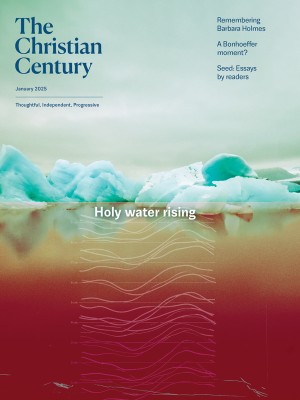Please, tell me what it says in the original Greek
Why are clergy so embarrassed to know things their job requires them to know?

Illustration by Øivind Hovland
Some time ago, I started to notice a habit shared by many of the mainline clergy of my acquaintance. Whenever a subject comes up that touches on their professional expertise, they turn awkward and apologetic. This might happen in a sermon, in a pastoral conversation, or just casually over a beer. In particular, any occasion that calls on their knowledge of biblical languages seems to give them a paroxysm of embarrassment. They cannot say the words “in the original Greek” without groaning, apologizing, adding layers of irony to the phrase. They seem so ashamed of some of the very knowledge that qualifies them to wear their collars that I almost feel bad asking them to share that knowledge with me.
This is very weird. It is a good thing to know biblical languages. In particular, given the way the Christian world long downplayed the knowledge of Hebrew—a situation that only started to be rectified during the Reformation—and given the historic association between the spread of humanistic, “useless” knowledge and political liberation and democracy, it is wonderful that thousands of humble pastors know difficult ancient languages. It is something to be happy about, if not exactly proud of—the way the Cuban government justly boasts of that island’s 99 percent adult literacy rate. (Cubans are then made to waste a lot of that literacy on a censored press. Nothing’s perfect.)
Read our latest issue or browse back issues.
It would be even cooler if we made our clergy learn Sanskrit or Yoruba or classical Chinese or ancient Babylonian too, just to have something to compare the biblical modes of writing to, but I suppose their jobs are hard enough, and we don’t want the MDiv to take even longer than it does. Also, biblical languages are hard. I have tried to teach myself both Hebrew and biblical Greek, with thus far pathetic results. Seminarians talk about their Hebrew classes the way my undergraduates talk about Calculus 2. These accomplishments are hard won, and it is weird indeed not to use them frequently and without shame. Athletes don’t apologize for being graceful and strong.
One reason mainline ministers refer to their academic training with such self-consciousness is that they’re worried about sounding pretentious, too far ahead of their audience. Yet the fundamentalists, with their far more open anti-intellectualism, rarely exhibit the same fear of coming off too learned. They love referring to the original Greek, and not always with exemplary scholarly care, either. The anti-intellectualism of the pew culture and the implicit authoritarianism of the preacher’s claim to special knowledge can even reinforce each other: You nice people just let me tell you what the Bible says. But even in fundamentalist circles this is not the only stance possible. My father knows, or used to know, more Koine Greek than I do, though I have two master’s degrees and he has just an associate’s degree, and it’s because our tiny, very flawed fundamentalist church saw the biblical languages as important enough to offer a Sunday school class on them. This place was so eager to appeal to normie, middle American, mostly White families that it could feel like a meeting of the chamber of commerce, and yet they weren’t afraid to offer this demanding class.
Meanwhile, Episcopalians will just straight up pronounce themselves “the church where you don’t have to turn off your brain”—how often I have sat in an Episcopal pew wishing that this were the case—and yet we get a whole song and dance before even the lightest reference to the Greek lexicon. (In fairness, one of the Episcopal churches I’ve attended as an adult also offered a Koine Sunday school class. It rocked. What little I’ve learned came from that experience.)
More generally, Americans have strange attitudes toward education itself. We spend a lot educating ourselves, but we distribute much of that funding on a “them that’s got shall have” model, so that many things that ought to be widely available stay relatively esoteric. Much of our best journalism is paywalled—as it must be, if we aren’t willing to pay for it through taxes. We ask our education systems to do simultaneously the work of educating young people and that of determining their place in a constantly shifting economic order. As a result, young adults emerge from their education with shame and fear about every class they didn’t ace, because failure has such high stakes.
But sometimes they feel even more shame about the classes they did ace, because such knowledge feels like an unfair advantage over other people—and if it’s humanistic knowledge you can’t use on Wall Street or in Silicon Valley, because it’s generally held to be outdated and irrelevant. Knowledge of the world’s great literature is stigmatized simultaneously as an elitist form of cultural capital and as a sucker’s bet.
So I get that it’s hard to know the best way to use a good humanities education when you’re talking to people whose attitudes toward such an education are likely to be riddled with discomfort and even hostility. I don’t have one weird trick to solve American anti-intellectualism (though I do think that equal funding of public schools plus free trade schools and community colleges would help). But I do know, from many years teaching required writing classes to students who think they don’t care about books or ideas, that you’ll get nowhere by legitimizing anti-intellectual attitudes. You have to challenge them, for everyone’s sake. And you can start by not apologizing for knowing things your job requires you to know.






